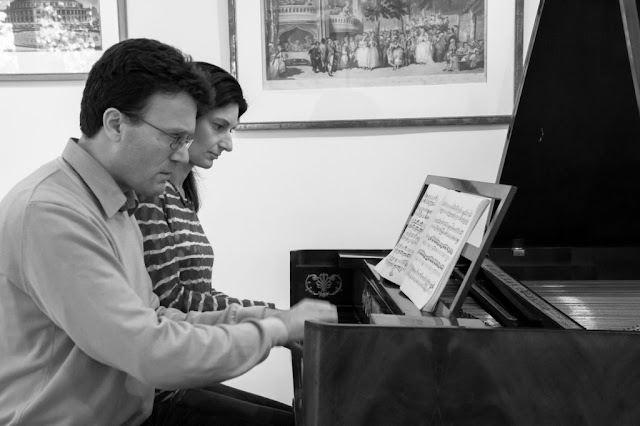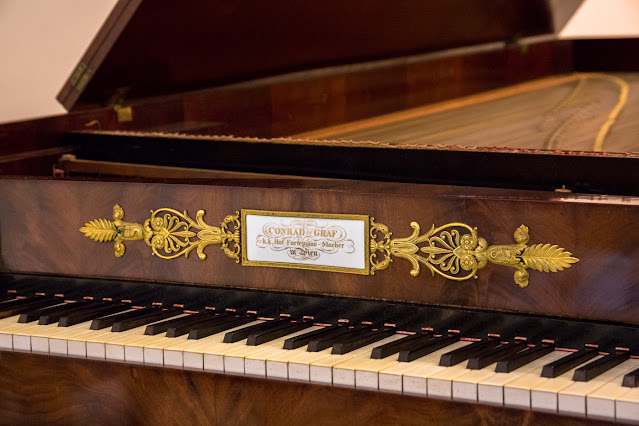Carl Maria von Weber Complete Keyboard Duets; Julian Perkins, Emma Abbate; Deux-Elles
Reviewed by Robert Hugill on 23 October 2020 Star rating: (★★★★)
A more intimate domestic side to Weber, but nonetheless full of imaginative touches and performed here with real affection
Carl Maria von Weber's output extended considerably further than his opera Der Freischütz and the occasional clarinet concerto, not that you would know it from the limited number of his works in regular circulation. A new disc of Weber's music on Deux-Elles introduces us to a different side of the composer as pianists Julian Perkins and Emma Abbate play Weber's complete keyboard duets (piano four-hands) on a Graf fortepiano from Vienna in 1826, the year of Weber's death.
Perkins and Abbate's careers span two worlds as Julian Perkins is best known as a harpsichordist and director of Cambridge Handel Opera and Sounds Baroque, whilst Abbate has made a career delving into contemporary and 20th century music for piano. But they were bequeathed a copy of Weber's keyboard duets by their late friend, the composer Stephen Dodgson (1924-2013) and decided to explore. The result is this disc which presents Weber's Six Petites Pieces Faciles, Op.3 (from 1803), Six Pieces, Op.10a (from 1810) and Huit Pieces, Op 60 (from 1820), alongside Mozart's Andante and Five Variations in G major, K501.
 |
| Julian Perkins and Emma Abbate (Photo Paul Lehane/Theatrical Photography) |
The pieces thus span Weber's career, and they introduce us to a sound-world which is surprisingly classical. For all Weber's Romantic credentials with Der Freischütz (from 1821) and Euryanthe (from 1823), he had a strongly classical vein running through him. Born eleven years before Schubert, Weber was a cousin of Mozart's wife (Constanze Mozart was the daughter of Weber's father's half-brother). The two composers never met, but it is an intriguing link. There is another link too, one which is less relevant to this disc but which is fascinating nonetheless.
As a teenager in Vienna, Weber studied with the pedagogue George Joseph Vogler, and a fellow student there would be one Jakob Beer. Six years younger than Weber, from a rich family and something of a prodigy too. The two would become friends, and in his later role as an opera conductor Weber would be supportive and conduct his friends operas. The friend, of course, became Giacomo Meyerbeer, doyen of the Paris Opera. In this way, we can see Weber spanning the musical generations.
One of the reasons why much of Weber's output has historically been overlooked is that we have a tendency to look at the composer simply through Wagnerian glasses. His later operas heavily influenced Wagner, and later in the 19th century a performance style of Weber's operas developed which allowed young Wagnerian singers to cut their teeth on Weber. But Reiza in Oberon is not kin to Wagner's Sieglinde, nor is Max in Der Freischütz kin to Wagner's Siegfried, and we understand Weber better if we consider his debt to classicism.
It should be remembered that these duets would have been written for public consumption, for sale. The piano duet was a popular medium with amateurs, and collections of 'easy' duets could have a large sale. The Opus 3 pieces are completely charming, none of them breaks the rules but Weber manages to make each one a separate charming gem, we have a Sonatine, a Romanze, A Menuetto, an Andente with variations, March and Rondo! With the Opus 10a pieces we move into more sophisticated territory, but still the composer is at pains to introduce variety so here the movements are Moderato, Andantino con moto, Andante with variations, Mazurka, Adagio and Rondo. There is greater harmonic sophistication here, and evidently the writing for the two parts is far more evenly distributed with the secondo often taking responsibility for themes. The Mazurka introduces us to some delightfully catchy rhythms, it really sounds fun, and the Adagio is perhaps the subtlest and most sophisticated movement so far.
By the time the Huit Pieces, Op.60 were published, Weber was reaching his prime and was working on Der Freischütz which would be premiered in 1821. These pieces do not aspire to the Romantic drama of later Beethoven, they are still inhabiting the classical world of Mozart and some Schubert, though there are moments in movements such as the Allegro when Romantic drama is close. This is poised music, yet sophisticated too. The composer is at pains to create music which would appeal to the paying public and make them want to play it, yet he knows his craft and is far more able to introduce varieties of colour and texture, and harmonic profundity. These pieces do not approach the depth of Schubert's finest music for piano duet, but there are moments which come pretty close, and the final two movements Mazurka and Rondo both takes us well beyond their chosen style, this is far more than 'characteristic music' and has real emotional depth.
The 'filler' is a piece by Mozart written in the year of Weber's birth, which makes you understand why he was such a hard act to follow.
 |
| Fortepiano by Conrad Graf, Vienna, 1826 (Photo Paul Lehane/Theatrical Photography) |
The use of a fortepiano brings a whole range of colour and timbres to the music, and as ever with Weber, his music responds to the clarity and sparkle which period instruments and style brings. And in the Allegro of the Opus 60 pieces, we even get to hear the Graf piano's delightful bassoon stop (I kid you not!).
This was intended to be sociable music, music to play with friends. Weber's wife was a singer, so perhaps we can imagine the two of them performing this music together, trying pieces out, or perhaps Weber and a favourite student. Sitting two abreast at a fortepiano is a very intimate experience and here Julian Perkins and Emma Abbate sound as if they are enjoying themselves. They play the music with real affection, and with a lovely sense of friendship and connection with the music.
Carl Maria von Weber (1786-1826) - Six petites pieces faciles, Op.3 (1803)
Carl Maria von Weber - Six pieces, Op. 10a (1810)
Wolfgang Amadeus Mozart (1756-1791) - Andante and 5 Variations in G major, K501
Carl Maria von Weber - Huit pieces, Op. 60 (1820)
Julian Perkins (fortepiano)
Emma Abbate (fortepiano)
Recorded at Waterdown House, Tunbridge Wells, Kent, 13-15 May 2019
Deux-Elles DXL184 1CD [72.23]
Available from Amazon, and Hive.co.uk.
- Everything via Association: composer Vic Hoyland on his 75th birthday - interview
- Welcome to the high energy world of Irish composer Ed Bennett: Psychedelia from NMC - CD review
- From the whole earth dancing to a day in hell: chamber music by Cheryl Frances-Hoad - CD review
- The case against Wagner - David Faiman's Meyerbeer: The deliberately forgotten composer - book review
- Mendelssohn Cello Sonatas and more: historically informed performances from cellist Viola de Hoog and pianist Mikayel Balyan - CD review
- Beethoven and Black muses: Gweneth Ann Rand, Simon Lepper, Stephan Loges, Eugene Asti at the Oxford Lieder Festival - concert review
- The BBC Symphony Orchestra at 90: in advance of the orchestra's celebratory concert, Tony looks at its distinguished history - feature
- Six Songs of Melmoth: premiere of Cheryl Frances-Hoad's new song-cycle at Oxford Lieder Festival - concert review
- A song is a song is a song: composer Errollyn Wallen on her multi-faceted career and her forthcoming EP with King's College Choir - interview
- From early Schubert to late Geoffry Bush: Robin Tritschler and Graham Johnson at the Oxford Lieder Festival - concert review
- Author of Light: The Sixteen in an engaging and uplifting programme of Tudor music at Temple Church - concert review
- Home




%20and%20kids.jpg)
.webp)





.jpg)
No comments:
Post a Comment